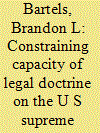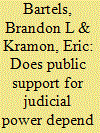| Srl | Item |
| 1 |
ID:
090830


|
|
|
|
|
| Publication |
2009.
|
| Summary/Abstract |
Does law exhibit a significant constraint on Supreme Court justices' decisions? Although proponents of the attitudinal model argue that ideology predominantly influences justices' choices, "hybrid models" posit that law and ideology exhibit discrete and concurrent effects on justices' choices. I offer a new conceptualization of legal constraint examining how legal rules permit varying degrees of ideological discretion, which establishes how strongly ideological preferences will influence justices' votes. In examining the levels-of-scrutiny legal doctrine, I posit theoretical models highlighting the differential constraining capacities of the strict scrutiny, intermediate scrutiny, and rational basis rules. I use a multilevel modeling framework to test the hypotheses within the context of the Grayned doctrine in free expression law. The results show that strict scrutiny, which Grayned applied to content-based regulations of expression, significantly constrains ideological voting, whereas intermediate scrutiny (applied to content-neutral regulations) and the low scrutiny categories each promote high levels of ideological voting.
|
|
|
|
|
|
|
|
|
|
|
|
|
|
|
|
| 2 |
ID:
171340


|
|
|
|
|
| Summary/Abstract |
Judicial power is central to democratic consolidation and the rule of law. Public support is critical for establishing and protecting it. Conventional wisdom holds that this support is rooted in apolitical factors and not dependent on who is in political power. By contrast, we argue that support may be driven by instrumental partisan motivations and therefore linked to partisan alignment with the executive. We test the argument with survey evidence from 34 African countries. To provide causal evidence, we conduct difference-in-differences analyses leveraging Ghana’s three presidential transitions since 2000. Across Africa, support for judicial power is high, while trust in courts is lower. However, presidential co-partisans are less supportive of horizontal judicial power over the president and more supportive of vertical power over the people. The article demonstrates the importance of partisan alignment with the executive in shaping support for judicial power, with implications for judicial behavior and legitimacy.
|
|
|
|
|
|
|
|
|
|
|
|
|
|
|
|